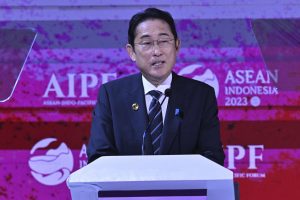For decades, a speech delivered in 1977 by then Prime Minister Fukuda Takeo in Manila, the last stop of his Southeast Asian tour, has been a pillar of Japan’s ASEAN policy. The speech, which became known as the “Fukuda Doctrine,” declared, first, that Japan would not become a military power but would contribute to peace and prosperity around the world; second, that it would build a relationship of mutual confidence and trust based on a “heart-to-heart” understanding with ASEAN; and third, that it would be an equal partner with ASEAN and its member countries, cooperating positively with them in their own efforts. ASEAN welcomed this new diplomatic position, which came less than four years after Tanaka Kakuei’s visit to Southeast Asia in 1974, a trip that had sparked intense anti-Japanese sentiment.
Given the historical background, the popularity of the Fukuda Doctrine was understandable. In the late 1960s, Britain announced its withdrawal from the “East of Suez.” The United States was also pulling out of mainland Southeast Asia and was calling on countries in the region to become self-sufficient in their defense. Saigon fell in 1975, signaling the end of the Vietnam War and a victory for the North Vietnamese forces.
In the absence of British and American military power, Japan, now the world’s second-largest economy, declared that it would “continue to engage with ASEAN” amid the looming threat of communism. It is easy to imagine how encouraging this would have been for ASEAN and how it would have fostered trust in Japan.
However, the Japanese economy, then more than six times larger than that of ASEAN, was by 2022 only 1.2 times bigger. In some areas, such as the take up of digital technology, ASEAN leads Japan. Moreover, many Japanese companies have been incorporated into the ASEAN economy through direct investment, and the nature of ASEAN’s growth is such that that it also contributes to the Japanese economy through investment returns. As such, relations between Japan and ASEAN should continue to be based on trust, while also aspiring to become a new sustainable and mutually beneficial relationship.
The ASEAN Study Group in Tokyo (ASGT), consisting of 170 stakeholders from industry, government, and academia involved in developing and implementing research, business, and policy-making related to ASEAN and its member countries, has compiled “10 Recommendations for the Further Promotion of ASEAN-Japan Friendship and Cooperation.” The recommendations, which encompass nine areas, have been prepared to coincide with the 50th Year of ASEAN-Japan Friendship and Cooperation.
The nine areas covered are ASEAN strategy and policy, maintaining free trade and economic integration, the Indo-Pacific initiative, manufacturing cooperation, connectivity, digitalization, energy and food security, monetary and financial cooperation, and youth and intellectual exchanges.
Among these areas, the core recommendations that require an ASEAN-led response can be found in the areas of maintaining free trade and economic integration and manufacturing cooperation.
To maintain free trade and cooperation, the ASGT has two recommendations: “ASEAN and Japan should uphold the principles of free trade and work together to maintain and expand a free trade and investment regime while building resilient and stable supply chains” and “A strong message should be communicated to strongly defend regional trade liberalization as a way to further deepen the ASEAN Economic Community (AEC).”
The first recommendation is based on the premise that free trade and investment will be to the economic benefit of both ASEAN and Japan. With concerns about decoupling and risks of supply shortages of important goods emerging around the world, it is essential to continue expanding and deepening the free trade network that ASEAN and Japan have built, addressing uncertainties and risks through supplier diversification and mutual accommodation.
As for the second recommendation, ASEAN has achieved a high level of intra-regional tariff elimination, but at the same time, non-tariff measures and barriers have been applied for reasons of national interest, effectively restricting free trade for certain goods. ASEAN itself must address and resolve these issues through peer pressure and discussion.
In the area of manufacturing cooperation, the ASGT recommends that “the development of the electric vehicle (EV) industry should include ASEAN-origin products in local procurement regulations, while avoiding protectionist measures in the interests of the region as a whole.”
ASEAN is currently the world’s fifth-highest producer of automobiles. However, competition within the region to establish EV production hubs is intensifying, with some member states calling for “domestic production” and others for “raw materials lock-in.” Insisting on domestic production may result in the loss of economies of scale and make manufacturing more expensive. That in turn could mean more competitive imported EVs and components. All this could nip ASEAN’s infant industry in the bud. At the very least, local procurement regulations should promote the EV industry at the regional level, including “ASEAN-origin products.”
The views of the ASGT also reflect those of Japanese companies heavily involved in ASEAN. Of course, ASEAN must lead the way, but support from Japan can help build a sustainable and mutually beneficial relationship. Japan and ASEAN have both enjoyed growth with the promotion of free trade. At this challenging time, they should once again join together in support of free trade.
































